Yoga tells us that we are whole and connected. Our chaotic external world tells us that we are incomplete, at least until we buy the next thing – the new est phone because it has the best speed, or the newest car because it has wifi and the best safety features, or the newest appliance because it will make sure that you never forget what groceries you need… the list is endless. In the moment, when we are loading up our carts and purchasing, we get a dopamine surge and we do feel better. After the ecstasy, we come crashing back down and feel disconnected again. The search begins again. How do we remember that connection? How can we spell relief? One way is r-e-t-r-e-a-t.
est phone because it has the best speed, or the newest car because it has wifi and the best safety features, or the newest appliance because it will make sure that you never forget what groceries you need… the list is endless. In the moment, when we are loading up our carts and purchasing, we get a dopamine surge and we do feel better. After the ecstasy, we come crashing back down and feel disconnected again. The search begins again. How do we remember that connection? How can we spell relief? One way is r-e-t-r-e-a-t.
I just returned home from our annual training at Sivananda Ashram in The Bahamas (Save the date! Next year is May 20 – 24, 2019). I arrive 2 days ahead of the start so I can take a personal mini-retreat. Two days of doing nothing but rest, reading, walking on the beach, meditation, silence, and eating healthy food that is prepared with love. Then our program starts, mornings begin with meditation, chanting, teachings, the LifeForce Yoga training, rest. The evenings close with more meditation, chanting, and teachings. In between, is bliss time! A beach walk and maybe a swim in the ocean. The Ashram is set up in such a way that even though I am working, there is ample time for retreating and self-care.
This is an opportunity to dive into connection with myself, and happily “creating space” has been handled – no news, no politics, no driving; no jostling for position in lines or traffic! Ahhhh, it’s time to just be, and in this quiet space, things can clear away. All the emotions and the tensions that have been building up within me start to fade. Work, travel, children, friends, family, etc., we are so busy with life that we don’t always have the time to deal with, or even acknowledge what’s coming up. If we have a daily practice, some of that buildup gets taken care of, but for most of us, self-care is the first thing that goes when stressors arise.
On the evening that I arrived, I walked the beach in the moonlight, the water lapping up over my feet, and the tears came. Not tears of sorrow or sadness, just tears, like my eyes were leaking. It felt like stresses that I had not been able to release in my day to day life, were being washed away. Every beach walk, every yoga practice, every breath practice, cleared and scrubbed me a little bit more. I have come home feeling lighter, brighter, more focused, and more relaxed.
Unfortunately, we cannot all go away on retreat on a regular basis, or even as often as we’d like, but, wherever you are, r-e-t-r-e-a-t. Here are some tips for connecting:
- Start a daily practice that makes you feel good and include meditation/yoga nidra
- Go on a technology cleanse for at least 24 hours – no internet, no TV, no devices, no news
- Spend a day in nature, “forest bathing”! – there is good research on how nature can elevate the mood
- Create a home spa day for yourself – cook some good food, do a couple of yoga practices, massage your feet, pamper your skin, take a bath, listen to soothing music, go for a walk, and limit devices
The more connected we feel the more we can improve our mental health!
In this newsletter, you will find some interesting research on how the brain’s neuroplasticity is improved by yoga, the practice of forgiveness, a review of Rama Jyoti Vernon’s new book The Gateway to Enlightenment, and a couple of opportunities for you to get away and reconnect with a program or at home with a new Yoga Nidra MP3.
Wishing you connection and optimum mental health. XO Rose
Research Spotlight
A randomized controlled dosing study of Iyengar yoga and coherent breathing for the treatment of major depressive disorder: Impact on suicidal ideation and safety findings.
This study looked investigated how much Iyengar Yoga and Coherent Breathing was needed as an intervention for Major Depressive Disorder (MDD) and Suicidal Ideation over a 12 -week period. 32 participants, with a diagnosis of MDD, were randomized into a High Dose Group (HDG) or a Low Dose Group (LDG) and assessed with Becks Depression Inventory II. The HDG received three 90-minute classes and four 30-minute homework sessions. The LDG received two 90-minute classes and three 30-minute homework sessions.
-week period. 32 participants, with a diagnosis of MDD, were randomized into a High Dose Group (HDG) or a Low Dose Group (LDG) and assessed with Becks Depression Inventory II. The HDG received three 90-minute classes and four 30-minute homework sessions. The LDG received two 90-minute classes and three 30-minute homework sessions.
The Iyengar Yoga sessions included seated or supine positions for centering with yoga sūtra translation and interpretation for the class, sun salutations, standing poses, twists, transition poses, backbends, inversions, deep relaxation with ujjayi (victory) breath, and ended with 20 minutes of coherent breathing. There were 11 unique yoga sequences, one per week, with the 11th done for two weeks. The homework sessions consisted of 15 minutes of posture and 15 minutes of coherent breathing.
Researchers found that there was a significant reduction in depressive symptoms for individuals suffering from Major Depressive Disorder (whether they were medicated or unmedicated). The researchers found that there was not a significant difference between the High Dose Group and the Low Dose Group. The researchers also found that the Iyengar Yoga with coherent breathing was associated with the resolution of Suicidal Ideation in eight out of nine participants. “This preliminary evidence suggests that this intervention may reduce SI without intent and be safe for use in those with MDD.”
Coherent Breathing has been a part of the LifeForce Yoga Practitioner Training Program since 2009 when Drs Brown and Gerbarg (researchers in this study) were guest teachers. We have also reviewed their book about the practice of coherent breathing, The Healing Power of the Breath, which includes a CD for practice led by Dr. Brown.
Yoga- and meditation-based lifestyle intervention increases neuroplasticity and reduces severity of major depressive disorder: A randomized controlled trial
To combat the effects of stress and trauma on our biochemistry, our brain uses neuroplasticity. This is how the brain and the nerves create new neural connections throughout the course of your life. There have been numerous studies on the benefits of yoga for depression, for anxiety, for cancer, for memory, etc. This study looks at the biomarkers (enzymes, hormones, etc) of neuroplasticity in people with Major Depressive Disorder in relationship to a yoga practice.
The purpose of this 12-week study was to determine the effects of a yoga- and meditation-based lifestyle for individuals suffering from Major Depressive Disorder (MDD), using biomarkers to measure neuroplasticity. 58 patients suffering from MDD were randomized into a Yoga group or a control group. Participants were assessed with the Beck Depression Inventory II scale and blood samples were collected before and after the intervention. The yoga group classes included āsana (postures), pranayama (breathwork), and dhyāna (meditation). In addition, this group participated in a lecture on lifestyle and lifestyle diseases. Read more and find three excellent practices (breathing, yoga and meditation) here…, as well as the study and abstract.
Forgiveness
 It is impossible to move through this world without hurting others. We are hurt, AND we hurt others. This does not mean that we, or others, are bad. It is a sign of our humanity. Sometimes offensive behavior is done out of ignorance, there is an unawareness that the behavior is hurtful. Other times we hurt or are hurt, out of anger, despair, fear, insecurity, sadness, or some other emotion. In this case, the offender knowingly harms. Forgiveness is the ability to let go of the anger, pain, sadness, resentment, etc. left by the incident. But, how do we forgive? Read more…
It is impossible to move through this world without hurting others. We are hurt, AND we hurt others. This does not mean that we, or others, are bad. It is a sign of our humanity. Sometimes offensive behavior is done out of ignorance, there is an unawareness that the behavior is hurtful. Other times we hurt or are hurt, out of anger, despair, fear, insecurity, sadness, or some other emotion. In this case, the offender knowingly harms. Forgiveness is the ability to let go of the anger, pain, sadness, resentment, etc. left by the incident. But, how do we forgive? Read more…
Internal Family Systems (IFS) Therapy & LifeForce Yoga – A Synergistic Model
In The Flo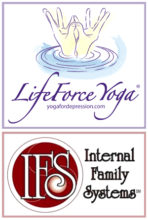 w: Lifeforce Yoga And Internal Family Systems Therapy
w: Lifeforce Yoga And Internal Family Systems Therapy
LifeForce Yoga® (LFY) practices are not only appropriate on the yoga mat but also in clinical settings. Presence, perspective, centered, compassion, connection, calm… these are a few of the words that describe who we already are beneath the constraints of our moods. Both LFY and IFS are described as ‘constraint release’ practices, that is, when we meet our challenges with compassion, both practices help us to clear the space, and we are able meet ourselves as whole; that which needs unburdening (IFS) can be released (LFY) and healed. This can happen in IFS with words alone, or in LFY with yogic practices and without words. Together IFS and LFY are synergistic and powerful paths to wellbeing. Read more…
LifeForce Yoga and Teens
Bringing Tools for Mood Management to Teenagers in New York
by Merrill Black, LCSW, Reiki Master, Hypnotherapist, RYT, Certified LFYP-1
 In March, I presented experiential LifeForce Yoga (LFY) to groups of teens at Ardsley High School’s 10th Annual Wellness Day & Fair, in Ardsley, NY. The theme was “Wellness Around the World” with emphasis on stress reduction and mental health; I felt right at home. Numerous tables and stations offered a variety of activities, exercises, foods, and alternative therapies which the teens could explore and experience.
In March, I presented experiential LifeForce Yoga (LFY) to groups of teens at Ardsley High School’s 10th Annual Wellness Day & Fair, in Ardsley, NY. The theme was “Wellness Around the World” with emphasis on stress reduction and mental health; I felt right at home. Numerous tables and stations offered a variety of activities, exercises, foods, and alternative therapies which the teens could explore and experience.
As the kids walked around, a group caught my eye. Smiling, I sat on my mat and said, “Hi! Do you want to try some yoga?” They looked up at the LifeForce Yoga sign and then asked one another if they wanted to do it. They agreed! It was so sweet. I had forgotten about those days, asking my pack of friends to join me do something I wanted to do. One of the boys was super psyched because he had done yoga before and I think that helped.
My first group of seven was six boys and one girl. This surprised me because over the past five years at my healing & yoga center, most of my students have been female. They were open to joining me as I explained about the many types of yoga. I spoke about how LifeForce Yoga uses breath, sounds, mudras (hand gestures), bhavana (images), and asana (postures) to meet their mood. Whether they are down, tired, anxious, or energized, breath can meet them right where they are. Read more…
NEW! Meditative Relaxation
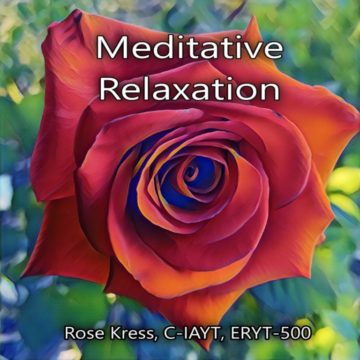 This 21 minute Yoga Nidra practice was created by Rose Kress for a military veteran population in a treatment facility. To make it more accessible to the general population, there is no “yoga” language within the practice, hence the title Meditative Relaxation.
This 21 minute Yoga Nidra practice was created by Rose Kress for a military veteran population in a treatment facility. To make it more accessible to the general population, there is no “yoga” language within the practice, hence the title Meditative Relaxation.
Yoga Nidra, when practiced daily, can improve sleep, increase concentration, balance the mind and the emotions, help the body to relax and facilitate reconnection. Because it is a meditation technique, one can experience the benefits of brain neuroplasticity, if one set aside time every day for practice. Schedule a self-care alarm for 2pm each day and try some yoga nidra, you will feel so much better! Download your copy here.
Review: Patañjali’s Yoga Sūtras – Gateway to Enlightenment by Rama Jyoti Vernon
Reviewed by Rose Kress
The Yoga Sūtras ar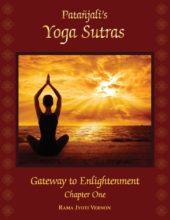 e a pathway for enlightenment. Now I don’t personally know enlightenment yet, though I suppose I will recognize it if I ever reach it. What I do know is that the Yoga Sūtras are a manual for a life free from suffering. At a 195 (or 196) aphorisms, the Yoga Sūtras are dense, so packed with information that it requires the guidance of a teacher to comprehend just one line. Rama Jyoti Vernon is that teacher. In her work, Patanjali’s Yoga Sūtras: Gateway to Enlightenment Chapter One, Rama provides clarity and wisdom gleaned from over 50 years of yoga study. It is no small feat to bring this 2,000+ year old work into the modern world. One might call what Rama has done “applied Yoga Sūtra study.”
e a pathway for enlightenment. Now I don’t personally know enlightenment yet, though I suppose I will recognize it if I ever reach it. What I do know is that the Yoga Sūtras are a manual for a life free from suffering. At a 195 (or 196) aphorisms, the Yoga Sūtras are dense, so packed with information that it requires the guidance of a teacher to comprehend just one line. Rama Jyoti Vernon is that teacher. In her work, Patanjali’s Yoga Sūtras: Gateway to Enlightenment Chapter One, Rama provides clarity and wisdom gleaned from over 50 years of yoga study. It is no small feat to bring this 2,000+ year old work into the modern world. One might call what Rama has done “applied Yoga Sūtra study.”
The discussion of the Yoga Sūtras begins with a brief introduction into yoga philosophy clarifying some of the concepts that appear through the sūtras. Rama then dives into the sūtras. Each sūtra includes the Sanskrit, the translation, and a short discourse that explains the sūtra. Rama then goes into greater depth to unpack the wisdom contained within the one line. This discussion, which includes examples and how you can apply this wisdom, sometimes take 20 pages – which is well worth the read. Read more…
LifeForce Yoga Practitioner Training
April 27 – May 1, 2018
Lewes, Delaware
Helllo Delaware! Registration is still open, only a few spots remain.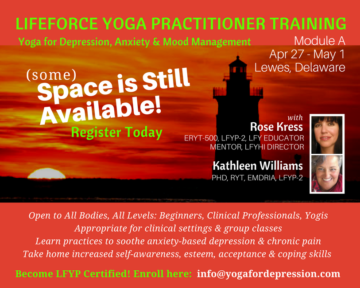
This is our first time in DE, and we’re looking forward to joining Involution Yoga. This Experiential workshop is open to all with yoga experience and is Part A of a 3-Part certification course to become a LifeForce Yoga Practitioner – Level 1.
Led by Rose Kress and Kathleen Williams, PhD, LifeForce Yoga Practitioner (LFYP) Training is open to all and offers certification for Health and Yoga Professionals. Our practice blends ancient disciplines with current research in psycho-neurobiology to provide evidence-based support that helps to clear obstructions (chronic tensions, constricting beliefs, limiting emotions) that may be keeping you, and those you serve, from knowing and expressing your fullest potential.
LifeForce Yoga emphasizes accessible yoga tools for managing mood, from daily fluctuations to chronic issues like anxiety, depression, PTSD, etc. This experiential program includes research, case studies, practice teaching in pairs, self-care, and a 40+ page manual.
There will also be opportunities for practicing with one and other and receiving feedback from the faculty. For those who are already LifeForce Yoga Practitioners, this can be taken as a refresher course. Yoga and healthcare professionals and general practitioners will learn strategies appropriate for a clinical setting that can safely release chronically held physical tension and repressed emotion.
Enjoy loving self-care while learning how to bring these tools to those that you serve. You will feel lighter, brighter, and filled with enthusiasm! Register here!
Level 2 Training Retreat
LifeForce Yoga Practitioner (LFYP) Trauma Specialist & Self-Care Mastery
May 20 – 27, 2018
Tucson, Arizona
Annual L2 Retreat Registration is On 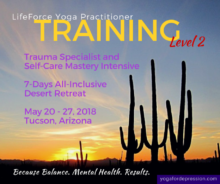
If you serve those with a history of trauma and wish to augment your therapeutic skills, on and off the mat, our enhanced 64-hour LifeForce Yoga Trauma Specialist certification program is for you. Increase your attunement skills; learn language modifications and practices that will allow the safe release of trauma memory stored in all the koshas (physical, energy, emotional and, mental levels of existence). Learn evidence-based yoga practices to help those suffering realize that, on the deepest level of their beings, they remain unharmed.
We have trainings throughout the year, but this one is an opportunity to dive into LifeForce Yoga at a deeper level, on our home turf! The Sonoran Desert setting offers you the opportunity to retreat & renew through LifeForce Yoga techniques while learning how to bring these tools to those that you serve. You will learn h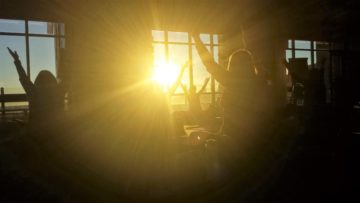 ow to integrate evidence-based yoga techniques, other than posture, into yoga classes, clinical settings, groups, etc.
ow to integrate evidence-based yoga techniques, other than posture, into yoga classes, clinical settings, groups, etc.
Join Rose Kress, Director of LifeForce Yoga and Senior LFYP Mentor Randy Todd, LICSW, RYT, and Guest faculty, Amy Weintraub, LifeForce Yoga founder and author of Yoga for Depression and Yoga Skills for Therapists; for a training immersion like no other. Faculty info
Days begin with self-care in the form of sunrise yoga and meditation, followed by a silent breakfast. Daily sessions include discussion, experiential learning, practice in pairs, and sharing. Enjoy afternoons walking the labyrinth, hiking the desert, or having a massage. Every afternoon includes a Yoga Nidra practice. Spend your lunch and dinner networking with other like-minded practitioners and individuals. After this training and self-care retreat, you will return home with a renewed daily practice, a tool-box full of self-care techniques, and tools to support your clients and students in reconnecting with their wholeness. A detailed manual with pictures, explanations, and scripts is included.
Spring in Tucson includes can be warm with plenty of sunshine; not to worry, the retreat center has a lovely pool! Days include a two and a half hour break for lunch so you can enjoy the grounds with hiking and outdoor breathing practices. CEUs for mental health professionals, yoga therapists, and yoga teachers. Level 2 LFYP Training offers certification for Health and Yoga Professionals and welcomes all who have experience with LifeForce Yoga; including those already certified, have attended our 7-day Training Intensive, or have completed Modules A & B.